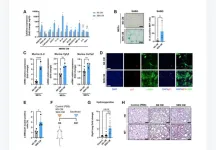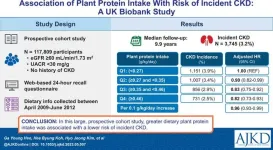(Press-News.org) New research reveals a type of monoclonal antibody already tested in certain forms of cancer may be a promising treatment in stopping the progression of amyotrophic lateral sclerosis, or ALS, a fatal neurodegenerative disease.
The study, led by scientists at Oregon Health & Science University, published today in the Proceedings of the National Academy of Sciences.
The study, involving a mouse model and confirmed in the tissue of human brains affected by ALS and donated after death, revealed for the first time that modulating immune cells can slow the progression of the disease. Previous research suggested a role for immune cells in ALS, but researchers this time used a high-throughput screening technique to identify a particular type of protein expressed on immune cells in the brain and spinal cord in people with ALS.
Researchers implicated the protein, known as alpha-5 integrin.
“When we blocked its expression in mice, we were able to slow down the disease,” said senior author Bahareh Ajami, Ph.D., assistant professor of molecular microbiology and immunology and behavioral neuroscience in the OHSU School of Medicine. “We hope that it will get to the clinic very soon.”
The team used a monoclonal antibody targeting a5 integrin, which had already been developed and used in treating certain forms of cancer. This means that it’s already undergone extensive safety studies to achieve approval through the Food and Drug Administration.
“Hopefully, it could be repurposed,” she said.
Using postmortem tissue from 139 brains donated for research, scientists confirmed the presence of a5 integrin within areas of the brain associated with motor function. Specifically, they found a5 integrin expressed by microglial cells and macrophages in blood – cells associated with the immune system – to be highly pronounced in the spinal cord, motor cortex and peripheral nerves during ALS.
They then tested the monoclonal antibody targeting a5 integrin in mice genetically predisposed to carry ALS and found that it protected motor function, delayed disease progression and increased mouse survival.
“We couldn’t believe they were doing so much better,” Ajami said.
Ajami, whose lab focuses on modulating the immune system to treat neurodegenerative diseases, said the study suggests the potential for applying immunotherapies to ALS as it’s already used in cancer and more recently through the use of monoclonal antibodies targeting Alzheimer’s disease.
“At this point, we cannot say it’s a cure but it’s a very interesting start,” she said. “It may be similar to what immunotherapy did for cancer or will do for Alzheimer’s by targeting immune cells.”
Ajami previously studied microglia in ALS. The study’s first author, Audie Chiot, Ph.D., of OHSU previously identified peripheral nerves macrophages as therapeutic targets in ALS mice. Today’s study complements their previous work by identifying a targetable protein on these cells.
Ajami came to OHSU in September of 2019, after beginning this line of research as a postdoctoral researcher at Stanford University. She said the next step in the research will be to develop dose response studies in the mouse model, and she ultimately hopes to see it progress to the point that it can be used to treat people with ALS.
In addition to Ajami and Chiot, co-authors on the study include Lawrence Steinman, M.D., Ph.D., of Stanford; co-first author Shanu F. Roemer, M.D., of the Mayo Clinic; Lisa Ryner and Michael Leviten of Pasithea Therapeutics; Alina Bogachuk, Katie Emberley, Dillon Brownell, Gisselle A. Jimenez, Randall Woltjer, M.D., Ph.D., of OHSU; and Dennis Dickson, M.D., of the Mayo Clinic.
The OHSU research received institutional support, with additional funding from the Fight Motor Neuron Disease Foundation and from Steinman’s Endowed Professorship at Stanford.
In the interest of ensuring the integrity of OHSU research and as part of a commitment to public transparency, OHSU actively regulates, tracks and manages relationships that our researchers may hold with entities outside of OHSU. Ajami and Steinman have a patent application for anti-a5 integrin for ALS and multiple sclerosis, assigned to Stanford University. Review details of OHSU's conflict of interest program to find out more about how we manage these business relationships.
All research involving animal subjects at OHSU must be reviewed and approved by the university’s Institutional Animal Care and Use Committee (IACUC). The IACUC’s priority is to ensure the health and safety of animal research subjects. The IACUC also reviews procedures to ensure the health and safety of the people who work with the animals. No live animal work may be conducted at OHSU without IACUC approval.
END
Study raises possibility of immunotherapy treatment for ALS
Publication led by OHSU researchers is the first to modulate a protein related to the immune system to slow progress of disease in mice
2023-07-31
ELSE PRESS RELEASES FROM THIS DATE:
Multi-level international study explores anxiety, concerns of families with a child with a neurodevelopmental condition during the COVID-19 pandemic
2023-07-31
A peer-reviewed study published in the Journal of Global Health analyzed data from more than 6,600 families with a child with a neurodevelopmental condition (NDC)—autism, attention-deficit/hyperactivity disorder, developmental language disorder, Down syndrome, Williams syndrome, and intellectual disability—from 70 countries, including the United States.
The study was led by Andrea Samson, associate professor of psychology at UniDistance Suisse and University of Fribourg, Switzerland, and Jo Van Herwegen, professor in developmental psychology and education at University College London’s ...
Human senescent fibroblasts cause lung fibrosis in mice
2023-07-31
“These observations support that accumulation of senescent cells may contribute to fibrotic lung disease [...]”
BUFFALO, NY- July 31, 2023 – A new research paper was published on the cover of Aging (listed by MEDLINE/PubMed as "Aging (Albany NY)" and "Aging-US" by Web of Science) Volume 15, Issue 14, entitled, “Human senescent fibroblasts trigger progressive lung fibrosis in mice.”
Cell senescence has recently emerged as a potentially relevant pathogenic mechanism in fibrosing interstitial lung diseases (f-ILDs), particularly in idiopathic pulmonary fibrosis. In a new study, researchers Fernanda Hernandez-Gonzalez, ...
Plant-based protein intake may reduce kidney disease risk
2023-07-31
Plant-based diets confer various health benefits, including lowering the risk of cardiovascular disease and certain cancers. However, the relationship between plant protein intake and the risk of chronic kidney disease (CKD) remains unclear. This study led by Ga Young Heo aimed to investigate the association between plant protein intake and the development of CKD. Using the UK biobank study data, the researchers found that participants with a higher plant protein intake had a lower risk of developing CKD. This finding suggests that a higher dietary intake of plant-based protein may be beneficial for kidney health and provide insight into ...
Researchers identify two new subtypes of HPV-associated head and neck cancers
2023-07-31
CHAPEL HILL, N.C. – Cases of human papillomavirus (HPV)-associated cancers of the head and neck, known as head and neck squamous cell carcinoma (HNSCC), are rapidly increasing throughout the United States. Unfortunately, relatively little is known about the factors that contribute to these tumors and what makes some tumors more aggressive and treatment-resistant than others.
To determine why some patients respond better to radiation therapy than others, researchers in UNC School of Medicine’s Department of Otolaryngology/Head and Neck ...
Endocrine Society and Matchbox Virtual Media announce joint venture
2023-07-31
WASHINGTON—The Endocrine Society and Matchbox Virtual Media are pleased to announce today that the organizations formed a joint venture that will bring exciting new opportunities for medical, healthcare, and scientific associations to better customize the experiences of their customers relative to producing meetings, organizing communities, and disseminating educational products.
The new joint venture will benefit from the Endocrine Society’s initial financial investments and its robust networking within the medical and scientific fields. Matchbox Virtual Media brings its proven platform, technologies, ...
Scientist who expands chemists’ tools joins The Wertheim UF Scripps Institute
2023-07-31
JUPITER, Fla. — A new scientist joining The Herbert Wertheim UF Scripps Institute for Biomedical Innovation & Technology invents creative and efficient ways to build complex, potentially useful molecules, studying their activity so that compounds found in nature may eventually become useful products, such as medications.
Synthetic chemist and associate professor Masayuki Wasa, Ph.D., joins the institute from Boston College, where he was an assistant professor of chemistry. Synthetic chemists specialize in assembling larger molecules from smaller parts, like a child assembling a Lego spaceship from a basket of oddly shaped pieces.
But the work is far from child’s ...
Thomas J. Herzog, MD takes office as The GOG Foundation, Inc. President
2023-07-31
At the NRG Oncology Summer Meeting on Thursday, July 20, 2023, at approximately 5:44pm EDT, Larry J. Copeland, MD passed the presidential gavel to Thomas J. Herzog, MD at The GOG Foundation, Inc. (GOG-F) Board of Directors meeting.
Dr. Herzog brings a comprehensive background in clinical trials, the integral business aspects and acumen to this important position. A practicing gynecologic oncologist and member of the Board of Directors of GOG-F, he has served as the Treasurer of GOG-F from 2014-2023 and prior ...
ACP issues updated guidance for colorectal cancer screening of asymptomatic adults
2023-07-31
Embargoed for release until 5:00 p.m. ET on Monday 31 July 2023
Annals of Internal Medicine Tip Sheet
@Annalsofim
Below please find summaries of new articles that will be published in the next issue of Annals of Internal Medicine. The summaries are not intended to substitute for the full articles as a source of information. This information is under strict embargo and by taking it into possession, media representatives are committing to the terms of the embargo not only on their own behalf, but also on behalf ...
Why you shouldn’t declaw tigers or other big cats
2023-07-31
Declawing house cats to keep them from scratching people and furniture is controversial – and even banned in some countries and areas in the U.S. – but the practice is not limited to house cats. In a new study, researchers looked at the effects of declawing on larger cat species and found that declawing disproportionately impacts their muscular capabilities as compared to their smaller brethren.
While it is illegal in the U.S. to surgically modify an exotic animal, declawing is still done on large cats like lions and tigers, often in an effort to allow cubs to more safely ...
Cutting-edge cancer research lab opens operations at Pepper Place
2023-07-31
BIRMINGHAM, Ala. – Birmingham’s Pepper Place has a striking new addition to its teeming farmers’ market and noted food offerings — a multimillion-dollar cancer research laboratory.
The lab is IN8bio’s new research and development facility in the Martin Biscuit Building at Pepper Place. This R&D space has about 6,000 square feet of wet lab space and around 4,000 square feet for offices, conferences and break areas. IN8bio is a biotechnology company focused on developing novel cellular therapies for cancer, with deep roots in cutting-edge cancer research developed at ...
LAST 30 PRESS RELEASES:
DGIST identifies “magic blueprint” for converting carbon dioxide into resources through atom-level catalyst design
COVID-19 vaccination during pregnancy may help prevent preeclampsia
Menopausal hormone therapy not linked to increased risk of death
Chronic shortage of family doctors in England, reveals BMJ analysis
Booster jabs reduce the risks of COVID-19 deaths, study finds
Screening increases survival rate for stage IV breast cancer by 60%
ACC announces inaugural fellow for the Thad and Gerry Waites Rural Cardiovascular Research Fellowship
University of Oklahoma researchers develop durable hybrid materials for faster radiation detection
Medicaid disenrollment spikes at age 19, study finds
Turning agricultural waste into advanced materials: Review highlights how torrefaction could power a sustainable carbon future
New study warns emerging pollutants in livestock and aquaculture waste may threaten ecosystems and public health
Integrated rice–aquatic farming systems may hold the key to smarter nitrogen use and lower agricultural emissions
Hope for global banana farming in genetic discovery
Mirror image pheromones help beetles swipe right
Prenatal lead exposure related to worse cognitive function in adults
Research alert: Understanding substance use across the full spectrum of sexual identity
Pekingese, Shih Tzu and Staffordshire Bull Terrier among twelve dog breeds at risk of serious breathing condition
Selected dog breeds with most breathing trouble identified in new study
Interplay of class and gender may influence social judgments differently between cultures
Pollen counts can be predicted by machine learning models using meteorological data with more than 80% accuracy even a week ahead, for both grass and birch tree pollen, which could be key in effective
Rewriting our understanding of early hominin dispersal to Eurasia
Rising simultaneous wildfire risk compromises international firefighting efforts
Honey bee "dance floors" can be accurately located with a new method, mapping where in the hive forager bees perform waggle dances to signal the location of pollen and nectar for their nestmates
Exercise and nutritional drinks can reduce the need for care in dementia
Michelson Medical Research Foundation awards $750,000 to rising immunology leaders
SfN announces Early Career Policy Ambassadors Class of 2026
Spiritual practices strongly associated with reduced risk for hazardous alcohol and drug use
Novel vaccine protects against C. diff disease and recurrence
An “electrical” circadian clock balances growth between shoots and roots
Largest study of rare skin cancer in Mexican patients shows its more complex than previously thought
[Press-News.org] Study raises possibility of immunotherapy treatment for ALSPublication led by OHSU researchers is the first to modulate a protein related to the immune system to slow progress of disease in mice





